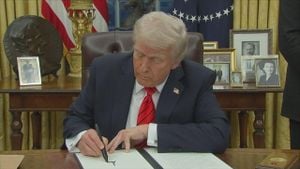On February 11, 2025, King Abdullah II of Jordan met with President Donald Trump at the White House to discuss Trump's controversial plan for Gaza, which includes relocating Palestinian residents to Egypt and Jordan. This proposal caught many off guard, including the King, who has long supported the two-state solution for the Israeli-Palestinian conflict.
The meeting arose shortly after Trump unveiled his vision for Gaza—a plan to transform the war-torn territory, currently, under scrutiny from various international stakeholders, and construct what he likened to the French Riviera. This ambitious project hinges on the forced displacement of Gaza's two million residents, sparking outrage across the Arab world and alarming officials who have pledged to safeguard Palestinian rights.
Historically, Jordan has been one of the most stable countries in the region, but it is also home to over two million Palestinian refugees, complicATING its position significantly. At the onset of their discussion, King Abdullah was forced to navigate the delicate diplomatic waters carefully. Despite their personal rapport, the King could not endorse Trump’s proposal without risking backlash domestically and regionally.
During the press briefing following their meeting, Abbott Abdullah reiterated his strong opposition to the displacement of Palestinians from Gaza, cementing Jordan's commitment to the two-state solution. "We cannot rebuild Gaza without the Gazans," he asserted, emphasizing the importance of Palestinian presence for any viable reconstruction effort.
Reported by multiple sources, including Al-Jazeera and the Washington Post, the tension in the Oval Office was palpable. While King Abdullah conveyed his gentle refusal to Trump’s claims of potential Jordanian compliance with his plan, sources noted the Jordanian monarch seemed uncomfortable. Even his visible tic and avoidance of answering direct questions posed by journalists illustrated the pressure he faced as he struggled to maintain Jordan’s interests without provoking the President.
"It is significant to find solutions considering the interests of all, especially the Jordanian people," highlighted King Abdullah after the meeting. This reflects his firm position on prioritizing Jordanian interests above all else, confirming he had recently expressed his doubts concerning the plan during bilateral talks with American officials.
The proposed resettlement of Palestinian refugees has been met with harsh reactions from multiple Arab nations. On several occasions during the press conference, Trump attempted to soften his stance by emphasizing he merely sought to negotiate favorable outcomes. "When we finish discussions, we'll have places where they can live very happily and safely," he stated, directly dismissing potential international backlash over plans seen by many as tantamount to ethnic cleansing. His confident remarks only seemed to deepen the unease felt by the King.
King Abdullah's cautious tone contrasted sharply with Trump’s unwavering assertion of control over Gaza. "I think there will be beautiful sites available both here and abroad for those displaced," Trump insisted. Therein lies the bedrock of disagreement, as Abdullah highlighted during various briefings with media personnel after the event.
Despite the King’s efforts to strike balance, he has faced immense pressure. Jordan’s historical ties with the West have long been pivotal; they provide significant military and financial support. Reports indicate the U.S. plans to grant up to 1 billion dollars annually to Jordan, making the King’s predicament even more complicated.
This direct aid is intended largely to bolster the country’s healthcare and education systems, but the political strings attached have caused friction, as Abdullah needs to defend his country’s interests against the backdrop of American demands.
Abdullah later confirmed the sharpening crisis surrounding Gaza could lead to serious humanitarian issues. "We have around 2,000 children dealing with grave illnesses needing medical care—these children must be processed immediately for treatment within Jordan," he stated, reminding the audience of the humanitarian realities at stake amid the rhetoric and alignments of power.
While Trump lauded the potential contributions to rebuilding from his administration, Abdullah maintained steadfast on the necessity of listening to regional voices. The Persian Gulf and neighboring countries are prepared to present their regional plan, which aligns with the established two-state framework. Abdullah noted, "It’s important to base discussions on collaboration, all concerned parties must agree for effective resolution."
The meeting also symbolizes the delicate dance of politics on the world stage. From Abdullah’s perspective, he hopes to mitigate repercussions on Jordan’s stability and its current population dynamics which have already been strained by previous conflict patterns.
The dialogue between the Jordanian King and Trump exemplifies broader regional concerns; any such forcible relocation of Palestinians could not only worsen the humanitarian crisis but also incite broader geopolitical unrest across several Middle Eastern countries. Former President Trump's urgency to control Gaza brings about a haunting echo of historical events wherein populations faced forced removals under dire circumstances.
On the regional and international scenes, King Abdullah's statements managing to convey Jordan’s firm stance against permanent resettlement strategies highlighted the unity expressed by Arab nations, centered upon collective regional interests. During the discussions, Trump alluded to potential pressure exerted on both Jordan and Egypt to comply with his plan, though both nations have remained firm against accepting large influxes of refugees.
Truly, insights drawn from the meeting indicate any comprehensive peace process must honor Palestinian sovereignty and the rights of refugees. This meeting is just one piece of the larger puzzle, with the King's diplomatic choreography and Trump's assertiveness foreshadowing intense negotiations to come.



